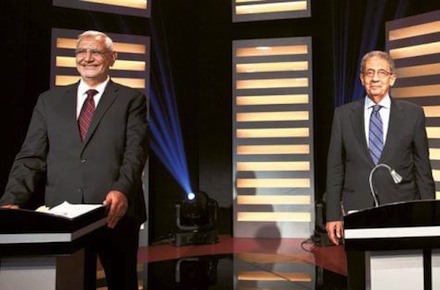With the voting in the second day of Egypt’s presidential election coming to a completion at 9 pm Cairo time, various camps are spinning “exit polls” — Al Jazeera is tweeting an exit poll of 60,000 voters and reporting that Mohammed Morsi (Muslim Brotherhood candidate) leads with 25%, Secular Arab Nasserist Hamdeen Sabahi follows with 22%, Islamist Abdel Moneim Aboul Fotouh at 21% and former Arab League secretary-general Amr Moussa at 19%, which would leave former Mubarak prime minister Ahmed Shafiq and the eight remaining candidates with just 13% of the vote.![]()
But if no one thought polls were reliable prior to the election, certainly no one expects exit polls to be accurate.
There is a general sense, however, in coverage of the various camps of the five frontrunners, that Morsi seems to be doing better than expected and Moussa worse. There’s just no way to know, though, until the votes have been counted, a process which will start tonight — results are expected by Sunday.
Meanwhile, Moussa and Shafiq have gotten into a very public spat while voting has been ongoing, with Moussa loudly calling on Shafiq to drop out of the race. Shafiq was pelted with stones and shoes yesterday as he cast his ballot, but otherwise the elections have been conducted without violence.




